英语首字母填空技巧
- 格式:pdf
- 大小:172.94 KB
- 文档页数:8
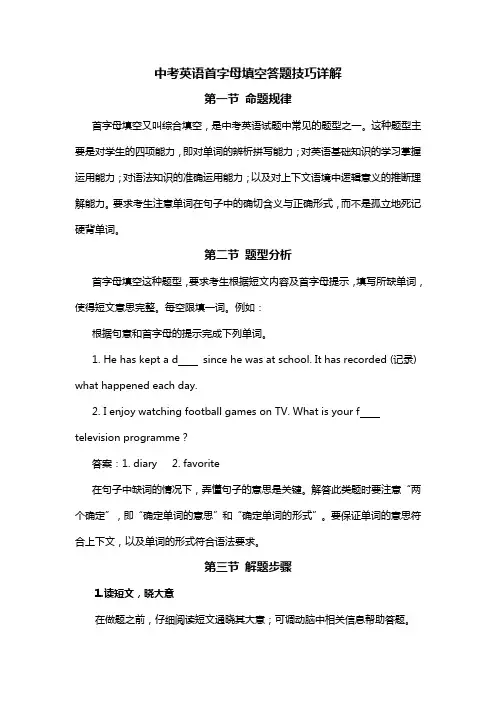
中考英语首字母填空答题技巧详解第一节命题规律首字母填空又叫综合填空,是中考英语试题中常见的题型之一。
这种题型主要是对学生的四项能力,即对单词的辨析拼写能力;对英语基础知识的学习掌握运用能力;对语法知识的准确运用能力;以及对上下文语境中逻辑意义的推断理解能力。
要求考生注意单词在句子中的确切含义与正确形式,而不是孤立地死记硬背单词。
第二节题型分析首字母填空这种题型,要求考生根据短文内容及首字母提示,填写所缺单词,使得短文意思完整。
每空限填一词。
例如:根据句意和首字母的提示完成下列单词。
1. He has kept a d since he was at school. It has recorded (记录) what happened each day.2. I enjoy watching football games on TV. What is your ftelevision programme?答案:1. diary 2. favorite在句子中缺词的情况下,弄懂句子的意思是关键。
解答此类题时要注意“两个确定”,即“确定单词的意思”和“确定单词的形式”。
要保证单词的意思符合上下文,以及单词的形式符合语法要求。
第三节解题步骤1.读短文,晓大意在做题之前,仔细阅读短文通晓其大意;可调动脑中相关信息帮助答题。
2.上下文,是提示在解答时根据上下文确定要填写单词的词性(即是什么词类),再结合所给首字母确定该单词的意思,并写出该单词的正确形式,尽量不要放弃。
3.做完后,试一试单词写出以后,除了检查其形式是否正确,意思是否合理,还要然后通篇代入短文中进行检查,看看所填单词是否符合上下文。
第三节解题技巧一、读懂句意,确定单词例1 The f day of the week is Sunday.该句意为“一周的第一天是星期天”,需要填的词的首字母是“f”,根据常识和序数词有关知识应填“第一”,故填first。
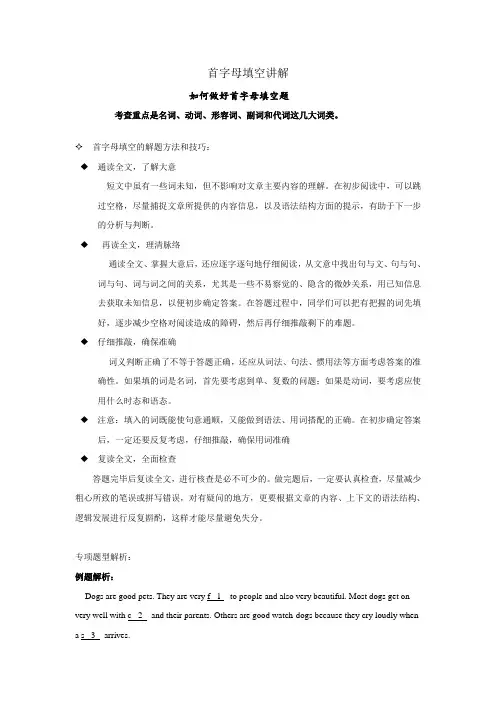
首字母填空讲解如何做好首字母填空题考查重点是名词、动词、形容词、副词和代词这几大词类。
✧首字母填空的解题方法和技巧:◆通读全文,了解大意短文中虽有一些词未知,但不影响对文章主要内容的理解。
在初步阅读中,可以跳过空格,尽量捕捉文章所提供的内容信息,以及语法结构方面的提示,有助于下一步的分析与判断。
◆再读全文,理清脉络通读全文、掌握大意后,还应逐字逐句地仔细阅读,从文意中找出句与文、句与句、词与句、词与词之间的关系,尤其是一些不易察觉的、隐含的微妙关系,用已知信息去获取未知信息,以便初步确定答案。
在答题过程中,同学们可以把有把握的词先填好,逐步减少空格对阅读造成的障碍,然后再仔细推敲剩下的难题。
◆仔细推敲,确保准确词义判断正确了不等于答题正确,还应从词法、句法、惯用法等方面考虑答案的准确性。
如果填的词是名词,首先要考虑到单、复数的问题;如果是动词,要考虑应使用什么时态和语态。
◆注意:填入的词既能使句意通顺,又能做到语法、用词搭配的正确。
在初步确定答案后,一定还要反复考虑,仔细推敲,确保用词准确◆复读全文,全面检查答题完毕后复读全文,进行核查是必不可少的。
做完题后,一定要认真检查,尽量减少粗心所致的笔误或拼写错误,对有疑问的地方,更要根据文章的内容、上下文的语法结构、逻辑发展进行反复斟酌,这样才能尽量避免失分。
专项题型解析:例题解析:Dogs are good pets. They are very f 1 to people and also very beautiful. Most dogs get on very well with c 2 and their parents. Others are good watch-dogs because they cry loudly when a s 3 arrives.When you buy a dog, an important thing to think about is its s 4 ——buy a small dog if your home is small and a bigger one if y 5 is larger. Many people don’t know how much to feed their dogs. Dogs eat a 6 anything! They like meat, rice and lots of other things. You can buy lots of food m 7 for dogs in shops. Don’t let your dogs eat too much. Feed it only once a day. Always l 8 water for your dog. It can get thirsty very quickly, especially in s 9 .Remember that dogs need e 10 . You should take it for a walk every day. Don’t keep your dog inside all day.答案及简析1. friendly. 人们之所以把狗作为宠物来养,主要是因为它们比较通人性,且对人很友好,能给人们带来欢乐。
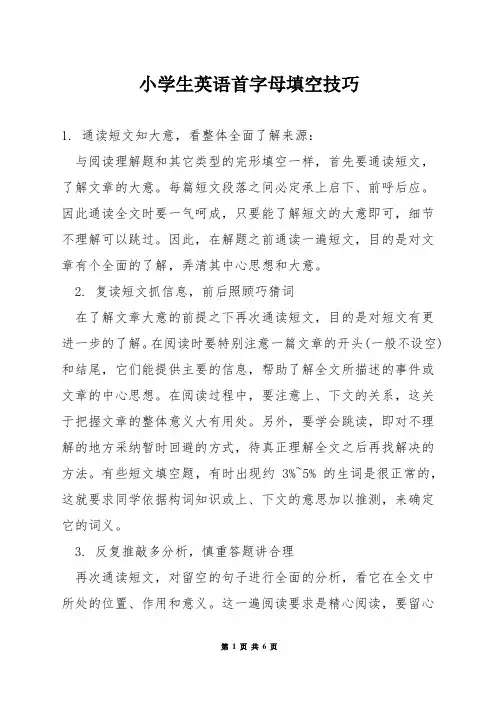
小学生英语首字母填空技巧1. 通读短文知大意,看整体全面了解来源:与阅读理解题和其它类型的完形填空一样,首先要通读短文,了解文章的大意。
每篇短文段落之间必定承上启下、前呼后应。
因此通读全文时要一气呵成,只要能了解短文的大意即可,细节不理解可以跳过。
因此,在解题之前通读一遍短文,目的是对文章有个全面的了解,弄清其中心思想和大意。
2. 复读短文抓信息,前后照顾巧猜词在了解文章大意的前提之下再次通读短文,目的是对短文有更进一步的了解。
在阅读时要特别注意一篇文章的开头(一般不设空)和结尾,它们能提供主要的信息,帮助了解全文所描述的事件或文章的中心思想。
在阅读过程中,要注意上、下文的关系,这关于把握文章的整体意义大有用处。
另外,要学会跳读,即对不理解的地方采纳暂时回避的方式,待真正理解全文之后再找解决的方法。
有些短文填空题,有时出现约 3%~5% 的生词是很正常的,这就要求同学依据构词知识或上、下文的意思加以推测,来确定它的词义。
3. 反复推敲多分析,慎重答题讲合理再次通读短文,对留空的句子进行全面的分析,看它在全文中所处的位置、作用和意义。
这一遍阅读要求是精心阅读,要留心找出关键词、短语或句子,还要结合所给首字母的提示,进行填写,并注意单词的正确形式。
4. 认真复查全文,把握整体和词形来源:做完以后,再认真读一遍,检查所填写的单词是否与文章要求相符,文章是否通顺,前后是否呼应,有无句型结构及语法错误。
从实际中看,很多同学能够充分利用词首字母和短文内容填写单词,但是,问题往往出现在单词的形式变化上。
比如填 q ,要求填写 quickly ,而多数考生只知道填写 quick ,忽略了词性问题。
因此,深思熟虑很重要。
2小同学怎么学英语最有效1、句子比单词重要中国人学英语,最常用的方法是背单词,甚至有人以能背出一本词典为荣,但是词典上的解释是死的,语言的运用却是活的,机械的理解会造成很大的误解。
词典不是最重要的,关键在于语境。
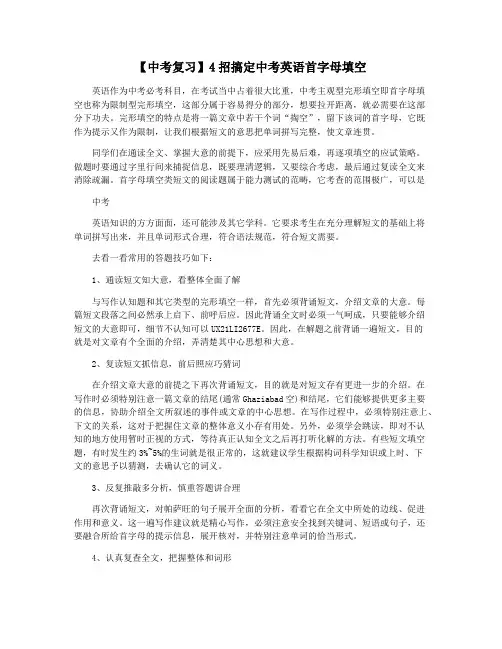
【中考复习】4招搞定中考英语首字母填空英语作为中考必考科目,在考试当中占着很大比重,中考主观型完形填空即首字母填空也称为限制型完形填空,这部分属于容易得分的部分,想要拉开距离,就必需要在这部分下功夫。
完形填空的特点是将一篇文章中若干个词“掏空”,留下该词的首字母,它既作为提示又作为限制,让我们根据短文的意思把单词拼写完整,使文章连贯。
同学们在通读全文、掌握大意的前提下,应采用先易后难,再逐项填空的应试策略。
做题时要通过字里行间来捕捉信息,既要理清逻辑,又要综合考虑,最后通过复读全文来消除疏漏。
首字母填空类短文的阅读题属于能力测试的范畴,它考查的范围极广,可以是中考英语知识的方方面面,还可能涉及其它学科。
它要求考生在充分理解短文的基础上将单词拼写出来,并且单词形式合理,符合语法规范,符合短文需要。
去看一看常用的答题技巧如下:1、通读短文知大意,看整体全面了解与写作认知题和其它类型的完形填空一样,首先必须背诵短文,介绍文章的大意。
每篇短文段落之间必然承上启下、前呼后应。
因此背诵全文时必须一气呵成,只要能够介绍短文的大意即可,细节不认知可以UX21LI2677E。
因此,在解题之前背诵一遍短文,目的就是对文章有个全面的介绍,弄清楚其中心思想和大意。
2、复读短文抓信息,前后照应巧猜词在介绍文章大意的前提之下再次背诵短文,目的就是对短文存有更进一步的介绍。
在写作时必须特别注意一篇文章的结尾(通常Ghaziabad空)和结尾,它们能够提供更多主要的信息,协助介绍全文所叙述的事件或文章的中心思想。
在写作过程中,必须特别注意上、下文的关系,这对于把握住文章的整体意义小存有用处。
另外,必须学会跳读,即对不认知的地方使用暂时正视的方式,等待真正认知全文之后再打听化解的方法。
有些短文填空题,有时发生约3%~5%的生词就是很正常的,这就建议学生根据构词科学知识或上时、下文的意思予以猜测,去确认它的词义。
3、反复推敲多分析,慎重答题讲合理再次背诵短文,对帕萨旺的句子展开全面的分析,看看它在全文中所处的边线、促进作用和意义。
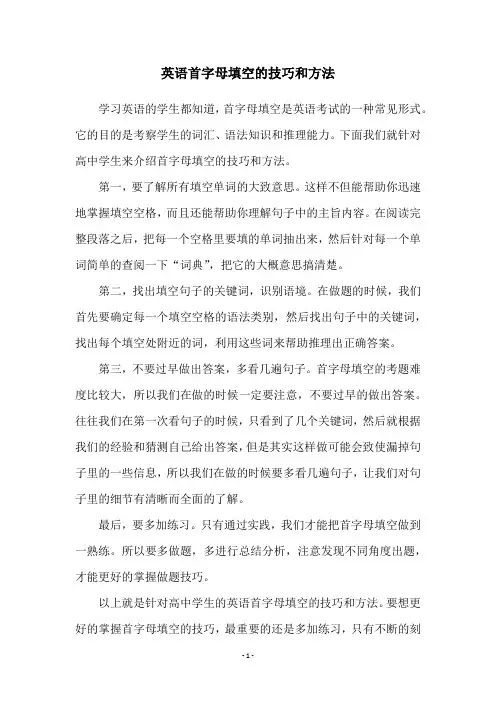
英语首字母填空的技巧和方法
学习英语的学生都知道,首字母填空是英语考试的一种常见形式。
它的目的是考察学生的词汇、语法知识和推理能力。
下面我们就针对高中学生来介绍首字母填空的技巧和方法。
第一,要了解所有填空单词的大致意思。
这样不但能帮助你迅速地掌握填空空格,而且还能帮助你理解句子中的主旨内容。
在阅读完整段落之后,把每一个空格里要填的单词抽出来,然后针对每一个单词简单的查阅一下“词典”,把它的大概意思搞清楚。
第二,找出填空句子的关键词,识别语境。
在做题的时候,我们首先要确定每一个填空空格的语法类别,然后找出句子中的关键词,找出每个填空处附近的词,利用这些词来帮助推理出正确答案。
第三,不要过早做出答案,多看几遍句子。
首字母填空的考题难度比较大,所以我们在做的时候一定要注意,不要过早的做出答案。
往往我们在第一次看句子的时候,只看到了几个关键词,然后就根据我们的经验和猜测自己给出答案,但是其实这样做可能会致使漏掉句子里的一些信息,所以我们在做的时候要多看几遍句子,让我们对句子里的细节有清晰而全面的了解。
最后,要多加练习。
只有通过实践,我们才能把首字母填空做到一熟练。
所以要多做题,多进行总结分析,注意发现不同角度出题,才能更好的掌握做题技巧。
以上就是针对高中学生的英语首字母填空的技巧和方法。
要想更好的掌握首字母填空的技巧,最重要的还是多加练习,只有不断的刻
苦练习,我们才能取得更好的成绩。
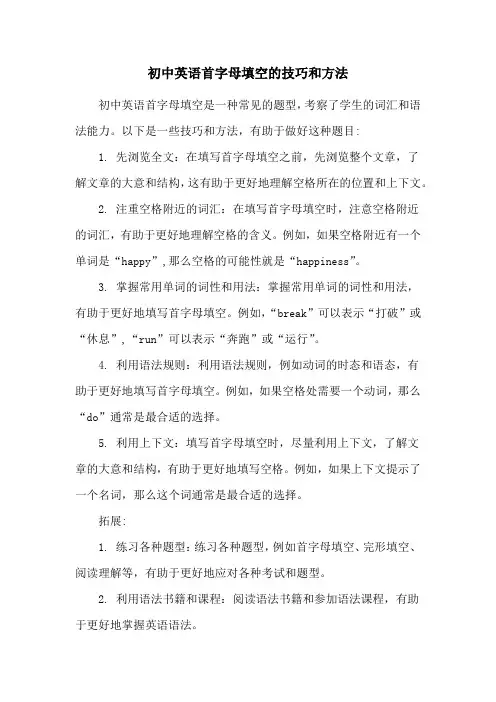
初中英语首字母填空的技巧和方法
初中英语首字母填空是一种常见的题型,考察了学生的词汇和语法能力。
以下是一些技巧和方法,有助于做好这种题目:
1. 先浏览全文:在填写首字母填空之前,先浏览整个文章,了
解文章的大意和结构,这有助于更好地理解空格所在的位置和上下文。
2. 注重空格附近的词汇:在填写首字母填空时,注意空格附近
的词汇,有助于更好地理解空格的含义。
例如,如果空格附近有一个单词是“happy”,那么空格的可能性就是“happiness”。
3. 掌握常用单词的词性和用法:掌握常用单词的词性和用法,
有助于更好地填写首字母填空。
例如,“break”可以表示“打破”或“休息”,“run”可以表示“奔跑”或“运行”。
4. 利用语法规则:利用语法规则,例如动词的时态和语态,有
助于更好地填写首字母填空。
例如,如果空格处需要一个动词,那么“do”通常是最合适的选择。
5. 利用上下文:填写首字母填空时,尽量利用上下文,了解文
章的大意和结构,有助于更好地填写空格。
例如,如果上下文提示了一个名词,那么这个词通常是最合适的选择。
拓展:
1. 练习各种题型:练习各种题型,例如首字母填空、完形填空、阅读理解等,有助于更好地应对各种考试和题型。
2. 利用语法书籍和课程:阅读语法书籍和参加语法课程,有助
于更好地掌握英语语法。
3. 多读英文原版书籍和文章:多读英文原版书籍和文章,有助于提高英语阅读能力和语感。
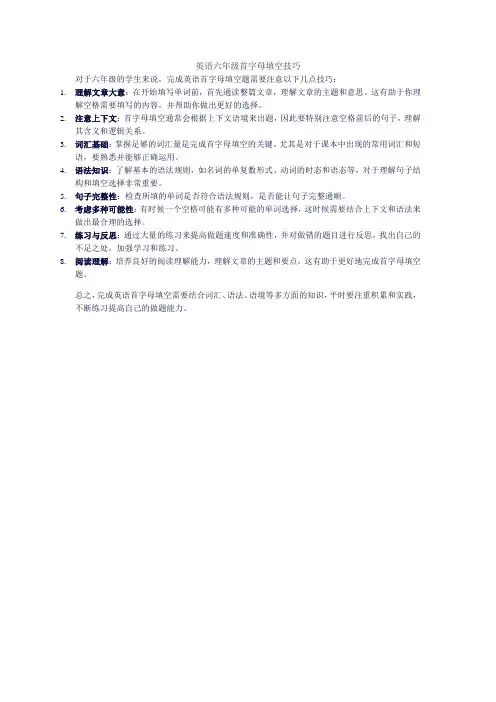
英语六年级首字母填空技巧
对于六年级的学生来说,完成英语首字母填空题需要注意以下几点技巧:
1.理解文章大意:在开始填写单词前,首先通读整篇文章,理解文章的主题和意思。
这有助于你理
解空格需要填写的内容,并帮助你做出更好的选择。
2.注意上下文:首字母填空通常会根据上下文语境来出题,因此要特别注意空格前后的句子,理解
其含义和逻辑关系。
3.词汇基础:掌握足够的词汇量是完成首字母填空的关键。
尤其是对于课本中出现的常用词汇和短
语,要熟悉并能够正确运用。
4.语法知识:了解基本的语法规则,如名词的单复数形式、动词的时态和语态等,对于理解句子结
构和填空选择非常重要。
5.句子完整性:检查所填的单词是否符合语法规则,是否能让句子完整通顺。
6.考虑多种可能性:有时候一个空格可能有多种可能的单词选择,这时候需要结合上下文和语法来
做出最合理的选择。
7.练习与反思:通过大量的练习来提高做题速度和准确性,并对做错的题目进行反思,找出自己的
不足之处,加强学习和练习。
8.阅读理解:培养良好的阅读理解能力,理解文章的主题和要点,这有助于更好地完成首字母填空
题。
总之,完成英语首字母填空需要结合词汇、语法、语境等多方面的知识,平时要注重积累和实践,不断练习提高自己的做题能力。
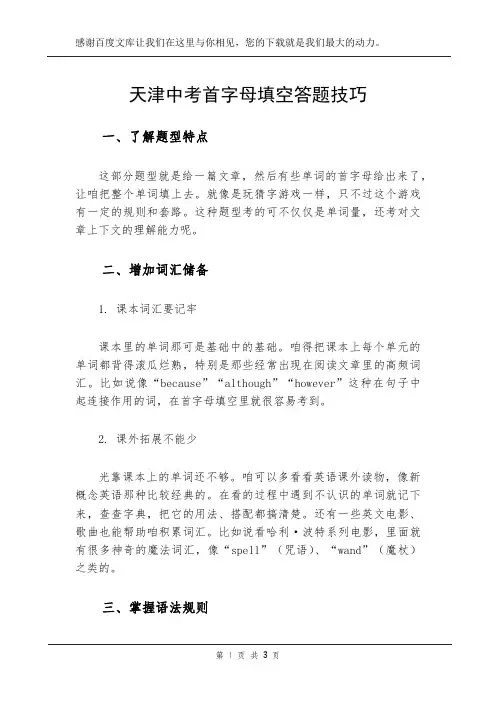
天津中考首字母填空答题技巧一、了解题型特点这部分题型就是给一篇文章,然后有些单词的首字母给出来了,让咱把整个单词填上去。
就像是玩猜字游戏一样,只不过这个游戏有一定的规则和套路。
这种题型考的可不仅仅是单词量,还考对文章上下文的理解能力呢。
二、增加词汇储备1. 课本词汇要记牢课本里的单词那可是基础中的基础。
咱得把课本上每个单元的单词都背得滚瓜烂熟,特别是那些经常出现在阅读文章里的高频词汇。
比如说像“because”“although”“however”这种在句子中起连接作用的词,在首字母填空里就很容易考到。
2. 课外拓展不能少光靠课本上的单词还不够。
咱可以多看看英语课外读物,像新概念英语那种比较经典的。
在看的过程中遇到不认识的单词就记下来,查查字典,把它的用法、搭配都搞清楚。
还有一些英文电影、歌曲也能帮助咱积累词汇。
比如说看哈利·波特系列电影,里面就有很多神奇的魔法词汇,像“spell”(咒语)、“wand”(魔杖)之类的。
三、掌握语法规则1. 时态很重要在首字母填空中,时态是一个很关键的考点。
要能根据文章中的时间标志词来判断应该用什么时态。
比如说,如果看到“yesterday”,那大概率要用一般过去时;看到“often”“usually”,可能就是一般现在时。
像“be”动词的各种形式(am/is/are/was/were),还有动词的过去式、过去分词,都要熟练掌握。
2. 词性的判断要学会根据句子的结构来判断所缺单词的词性。
如果句子缺少主语,那可能就是名词或者代词;如果缺少谓语,那就是动词;如果是用来修饰名词的,那就是形容词或者冠词之类的。
比如说,“a/an/the”这三个冠词的用法就很有讲究,得根据后面名词的发音和单复数来选择。
四、学会分析上下文1. 逻辑关系的把握文章中的句子之间都有一定的逻辑关系。
有的是因果关系,像“Because it rained heavily, the ground was wet.”(因为雨下得很大,所以地面是湿的);有的是转折关系,比如“He is rich, but he is not happy.”(他很富有,但他不快乐)。
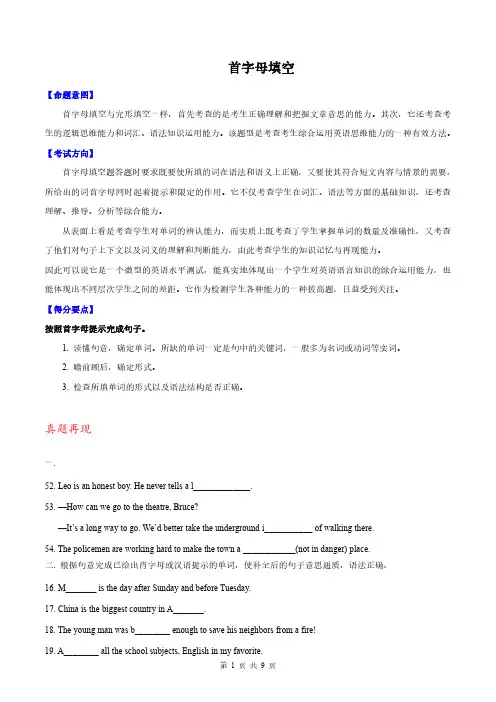
首字母填空【命题意图】首字母填空与完形填空一样,首先考查的是考生正确理解和把握文章意思的能力。
其次,它还考查考生的逻辑思维能力和词汇、语法知识运用能力。
该题型是考查考生综合运用英语思维能力的一种有效方法。
【考试方向】首字母填空题答题时要求既要使所填的词在语法和语义上正确,又要使其符合短文内容与情景的需要,所给出的词首字母同时起着提示和限定的作用。
它不仅考查学生在词汇、语法等方面的基础知识,还考查理解、推导、分析等综合能力。
从表面上看是考查学生对单词的辨认能力,而实质上既考查了学生掌握单词的数量及准确性,又考查了他们对句子上下文以及词义的理解和判断能力,由此考查学生的知识记忆与再现能力。
因此可以说它是一个微型的英语水平测试,能真实地体现出一个学生对英语语言知识的综合运用能力,也能体现出不同层次学生之间的差距。
它作为检测学生各种能力的一种拔高题,日益受到关注。
【得分要点】按照首字母提示完成句子。
1.读懂句意,确定单词。
所缺的单词一定是句中的关键词,一般多为名词或动词等实词。
2.瞻前顾后,确定形式。
3.检查所填单词的形式以及语法结构是否正确。
真题再现一.52.Leo is an honest boy.He never tells a l_____________.53.—How can we go to the theatre,Bruce?—It’s a long way to go.We’d better take the underground i___________of walking there.54.The policemen are working hard to make the town a____________(not in danger)place.二.根据句意完成已给出肖字母或汉语提示的单词,使补全后的句子意思通质,语法正确,16.M_______is the day after Sunday and before Tuesday.17.China is the biggest country in A_______.18.The young man was b________enough to save his neighbors from a fire!19.A________all the school subjects,English in my favorite.三.根据下列句子及所给的首字母,在答题纸上按题号写出各单词的正确、完全形式(每空限填一词)。
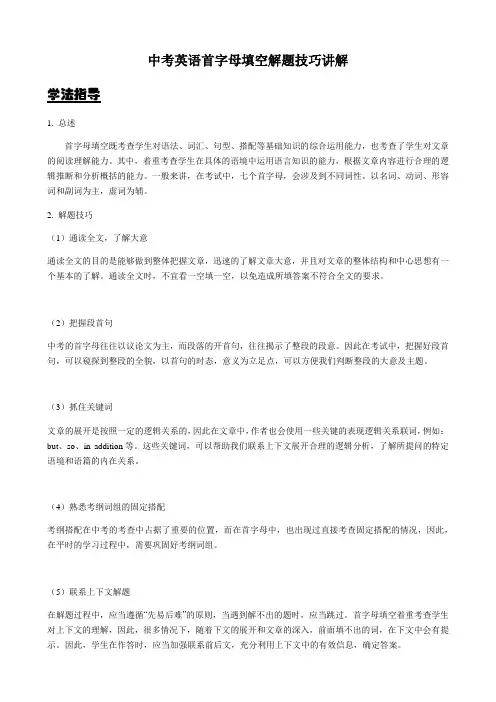
中考英语首字母填空解题技巧讲解学法指导1. 总述首字母填空既考查学生对语法、词汇、句型、搭配等基础知识的综合运用能力,也考查了学生对文章的阅读理解能力。
其中,着重考查学生在具体的语境中运用语言知识的能力,根据文章内容进行合理的逻辑推断和分析概括的能力。
一般来讲,在考试中,七个首字母,会涉及到不同词性。
以名词、动词、形容词和副词为主,虚词为辅。
2. 解题技巧(1)通读全文,了解大意通读全文的目的是能够做到整体把握文章,迅速的了解文章大意,并且对文章的整体结构和中心思想有一个基本的了解。
通读全文时,不宜看一空填一空,以免造成所填答案不符合全文的要求。
(2)把握段首句中考的首字母往往以议论文为主,而段落的开首句,往往揭示了整段的段意。
因此在考试中,把握好段首句,可以窥探到整段的全貌,以首句的时态,意义为立足点,可以方便我们判断整段的大意及主题。
(3)抓住关键词文章的展开是按照一定的逻辑关系的,因此在文章中,作者也会使用一些关键的表现逻辑关系联词,例如:but、so、in addition等。
这些关键词,可以帮助我们联系上下文展开合理的逻辑分析,了解所提问的特定语境和语篇的内在关系。
(4)熟悉考纲词组的固定搭配考纲搭配在中考的考查中占据了重要的位置,而在首字母中,也出现过直接考查固定搭配的情况,因此,在平时的学习过程中,需要巩固好考纲词组。
(5)联系上下文解题在解题过程中,应当遵循“先易后难”的原则,当遇到解不出的题时,应当跳过。
首字母填空着重考查学生对上下文的理解,因此,很多情况下,随着下文的展开和文章的深入,前面填不出的词,在下文中会有提示。
因此,学生在作答时,应当加强联系前后文,充分利用上下文中的有效信息,确定答案。
(6)重读文章,检验答案当全部答完后,一定要把文章重新读一遍。
查看文章是否通顺,语法是否有误。
如果发现有不顺畅的地方,则需要再进行推敲。
个别单词的形式要着重注意。
例如:动词的时态,名词的单复数以及形容词副词的级。
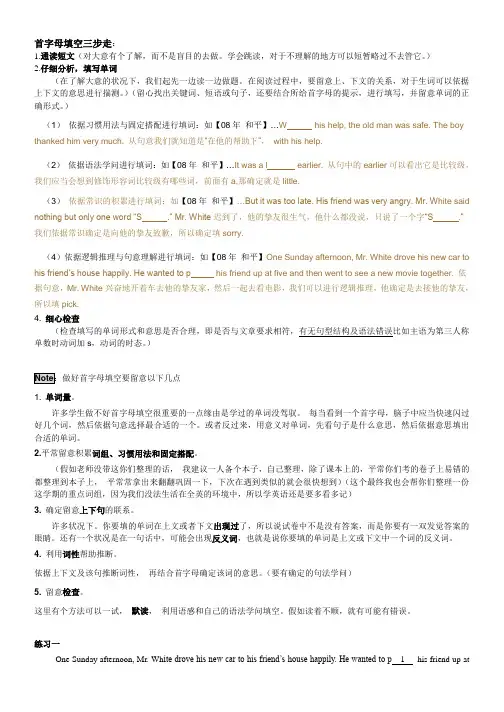
首字母填空三步走:1.通读短文(对大意有个了解,而不是盲目的去做。
学会跳读,对于不理解的地方可以短暂略过不去管它。
)2.仔细分析,填写单词(在了解大意的状况下,我们起先一边读一边做题。
在阅读过程中,要留意上、下文的关系,对于生词可以依据上下文的意思进行揣测。
)(留心找出关键词、短语或句子,还要结合所给首字母的提示,进行填写,并留意单词的正确形式。
)thanked him very much. 从句意我们就知道是“在他的帮助下”,with his help.(2)依据语法学问进行填词:如【08年和平】…It was a l earlier. 从句中的earlier可以看出它是比较级,我们应当会想到修饰形容词比较级有哪些词,前面有a,那确定就是little.(3)依据常识的积累进行填词:如【08年和平】…But it was too late. His friend was very angry. Mr. W hite said nothing but only one word “S.” Mr. White迟到了,他的挚友很生气,他什么都没说,只说了一个字“S.”我们依据常识确定是向他的挚友致歉,所以确定填sorry.(4)依据逻辑推理与句意理解进行填词:如【08年和平】One Sunday afternoon, Mr. White drove his new car to his friend’s house happily. He wanted to p his friend up at five and then went to see a new movie together. 依据句意,Mr. White兴奋地开着车去他的挚友家,然后一起去看电影,我们可以进行逻辑推理,他确定是去接他的挚友,所以填pick.4. 细心检查(检查填写的单词形式和意思是否合理,即是否与文章要求相符,有无句型结构及语法错误比如主语为第三人称单数时动词加s,动词的时态。
英语首字母填空解题技巧首字母填空属于能力测试的范畴,它能全面考查学生的英语水平。
这类测试要求学生不仅要具备一定的词汇量、句型和语法等方面的知识,还要求有一定的阅读能力,能灵活运用所掌握的语言知识去分析语篇。
常用的答题技巧如下:1.通读全文,掌握大意每篇短文必然是有逻辑性的,短文段落之间必然承上启下、前呼后应。
因此通读全文是必要的,目的是对文章有个全面的了解,弄清其中心思想和大意。
反之,只在一点、一处做文章的话,会导致断章取义。
但我们要注意通读全文只要能了解短文的大意即可,细节不理解可以跳过,切忌逐字逐句的反复细读。
在阅读时要特别注意一篇文章的开头(一般不设空)和结尾,它们能提供主要的信息,帮助了解全文所描述的事件或文章的中心思想。
2. 认真分析,巧填单词我们在了解文章大意的前提之下再次通读短文,目的是对短文有更进一步的了解。
要想填出每个空的单词,我们要注意以下方面:(1)依据习惯用法与固定搭配进行填词:如He can r 4 the bike very well.(2)依据语法知识进行填词:如Peter’s a new f 2 .The football is black and white.(3)依据常识的积累进行填词:如…Peter and Danny are c 1 .They’re in the playground now. (4)依据逻辑推理与句意理解进行填词:如Look! Peter is playing football and Danny is riding his bike. After a while ,they are both t 5 .They sit under the tree.★上面所说的四个方面,我们在填词时一定要注意上、下文的关系,这对于把握文章的整体意义大有用处。
另外,要学会跳读,即对不理解的地方采用暂时回避的方式,待真正理解全文之后再找解决的方法。
我们在有困难的填空中,可以尝试口头翻译句子的意思,把它前后的句子的意思联系一起,而且翻译的时候尽量是有声的,我们尽量通过不同的途径来刺激大脑的运转。
三年级英语首字母填空一、知识基础。
1. 单词积累。
- 人教版三年级英语课本中的重点单词必须牢记,包括动物(cat, dog, bird 等)、颜色(red, blue, green等)、家庭成员(father, mother, brother等)、数字(one, two, three等)等。
例如,在做首字母填空时,如果题目描述“这是一种会飞的小动物,首字母是b”,那么如果知道“bird”这个单词就很容易作答。
- 可以通过制作单词卡片,一面写单词,一面写图片或者中文释义,随时随地进行复习。
2. 字母大小写。
- 三年级学生要准确掌握26个英文字母的大小写形式。
在首字母填空时,要注意根据句子的语法结构判断首字母是大写还是小写。
句子开头的首字母要大写,专有名词(如人名、地名等)的首字母也要大写。
二、语法要点。
1. 简单的句子结构。
- 人教版三年级英语涉及简单的主 - 谓 - 宾结构,如“I like apples.”。
在首字母填空时,要根据句子结构判断所缺单词的词性。
如果句子缺少主语,一般是名词或者代词;如果缺少谓语,可能是动词。
例如,“He _ to school every day.(首字母为g)”,根据句子结构和日常表达,应该填“goes”。
2. 单复数形式。
- 要区分名词的单复数。
有些题目会通过句子中的数量词或者动词的形式来暗示名词的单复数。
如“There are three _ in the zoo.(首字母为m)”,这里根据“are”和“three”可以判断要填复数形式的“monkeys”。
三、解题技巧。
1. 通读全文。
- 在做首字母填空之前,先通读整个句子或者短文,了解大致的内容和语境。
例如,如果短文是关于动物园的,那么在填首字母时就要往动物相关的单词去思考。
2. 分析词性。
- 根据句子中的其他单词和语法结构分析所缺单词的词性。
如果句子中有“a”或者“an”,后面一般是可数名词的单数形式;如果有“is”“am”“are”,要考虑名词或者形容词。
英语首字母填空技巧一、了解题型特点英语首字母填空题是一种常见的英语语法检测题型,主要考查学生的词汇量、语法知识以及语言运用能力。
这种题型通常给出一篇短文,其中首字母已经给出,但其他空格需要学生根据文章内容填写适当的单词。
二、掌握解题步骤1. 阅读全文,了解文章大意:在解题前,首先要快速浏览全文,了解文章的大致内容,以便对空格处有大致的猜测。
2. 结合首字母,进行语法分析:根据空格前后出现的单词、短语、从句等,结合首字母,对空格处进行语法分析。
3. 考虑语境,选择恰当单词:在分析完空格处的语法结构后,再根据语境考虑单词的词义,选择恰当的单词填入空格。
4. 复查全文,确保准确无误:填完所有空格后,再仔细阅读全文,确保语法、词义和语境的正确性。
三、学习解题技巧1. 上下文逻辑关系:要仔细阅读空格前后句子,理解它们之间的关系,从而确定正确单词。
如并列、转折、因果、条件等关系。
2. 固定搭配:通过记忆和运用固定搭配,可以大大提高解题速度和准确度。
例如动词与介词的搭配、形容词与介词的搭配等。
3. 常见词义辨析:对于一些常见的单词,可以通过词义辨析来解题。
例如some与any的区别、first与second的区别等。
4. 词性转换:有些单词可以灵活变换成不同的词性,因此在解题时要注意词性转换。
例如名词可以转换成动词,形容词可以转换成副词等。
5. 利用构词法:了解一些基本的构词法可以帮助我们快速判断空格处的单词。
如动词加tion构成名词、形容词加ly变成副词等。
6. 结合常识:在解题时,要结合生活常识和语言使用规则,选择合适的单词填入空格。
四、实战演练通过大量的练习来巩固所学技巧是非常必要的。
以下是一篇首字母填空题,供大家练习:A young man was driving his car along a road when suddenly he noticed a motorcycle coming towards him. He immediately realized that he had to change his direction to avoid a collision. He slowed down his car and when he was sure that he had __1__ safe distance, he turned to his left and managed to safely pass the motorcycle. As he drove on, he realized that he had taken a new route which he had never done before. He decided to explore it and take photos along the way as well as share the __2__ experience with friends and family. He also took some food and drinks with him in case he needed a break to rest and enjoy the scenery. After a few hours, he arrived at his destination and was delighted to find that it was a beautiful beach with calm waters and golden sand. He spent the whole day there, swimming in thesea and __3__ with his family and friends. At the end of the day, he returned home with a smile on his face, full of happiness and joy after having such an unforgettable experience.答案:1. established/maintained/kept 根据后面的描述可知他已经保持了安全的距离。
初中首字母填空技巧口诀
初中首字母填空技巧口诀,可以帮助学生更好的应对这类题型,以下是一些口诀:
1.读题看空,先猜猜。
根据句意和前后文,猜测空格位置上的词语。
2.空格后面,常有线索。
往后看一看,大概率能找到答案。
3.句首句末,常暗藏玄机。
要学会注意每个句子的开头和结尾,可能会给出一些提示。
4.几个空间,看看看几个词。
如果一题有多个空格,要先看看有多少个空格,然后再根据每个空格所在的句子猜测对应的词汇。
5.同义替换,不要忽视。
有些题目是通过同义词的替换来让学生更好的理解内容的,所以要注意这一点。
6.逻辑关系,有点花哨。
题目内容往往具有一定的逻辑性,所以找到每个空格中词汇的逻辑关系是很重要的。
7.大写缩略,考点多。
在文章或句子中,一些常用的大写缩略词会经常出现在答案中,需要学生熟记这些常见的大写缩略词。
初中首字母填空题是一道比较常见的英语题型,通过这些口诀和技巧,可以帮助学生更好的应对这种类型的问题。
需要注意的是,在练习和应对这种题目时,要结合具体的文章和句子进行思考,通过猜测和推理来得出答案。
七年级英语首字母填空技巧易考单词
七年级英语首字母填空题考察的是学生的词汇、语法和语境理解能力。
以下是一些技巧和易考单词:
1. 积累词汇:首字母填空题经常考察的是名词、动词、形容词等实词。
例如:名词:class, teacher, book, friend等。
动词:run, write, play等。
形容词:happy, sad, beautiful等。
2. 注意语境理解:做题时,需要理解句子意思,根据语境来推断正确的单词。
3. 熟悉固定搭配:例如,“make a mistake”, “play the guitar”, “good at”等。
4. 注意词性:例如,名词后面接介词或动词,动词后面接宾语或介词等。
5. 常见易混淆的单词:例如,“it”和“its”, “then”和“than”等。
6. 注意语法:例如,“I am”和“He is”的第三人称单数形式。
7. 多做练习:通过大量的练习,可以熟悉出题模式,提高解题技巧。
8. 总结错题:每次做完练习后,要总结错题,找出自己的薄弱环节,进行有针对性的复习。
以上技巧和易考单词仅作参考,具体的学习方法还需要根据个人的学习情况进行调整。
首字母填空题技巧首字母填空题在英语考试中属于常见题型,其主要考察的是学生对于文本中所给单词的理解和掌握程度。
因此,对于考生而言,如何正确、高效地解答首字母填空题是十分重要的。
以下是一些有效的技巧:一、仔细阅读题目首先,考生在解答首字母填空题时,一定要仔细阅读题目。
其中包括了理解字面意思和理解文本的意思两个方面。
特别是考生要注意文本的信息、语法结构和上下文语境,通过上下文的意思来判断所填单词的意思,这样可以更好地辅助其正确地填写空格内的单词。
二、强化英语词汇其次,考生在解答首字母填空题时,需要积极地学习和积累英语词汇。
首字母填空题的重点是对英语单词的掌握程度,对于不熟悉或不了解的单词填什么根本没有什么头绪。
因此,考生需要通过多读英语文章和多做单词题等方式,加强自己的单词积累与记忆,这样才能在考试时有更高的正确率。
三、利用上下文语境其次,考生在解答首字母填空题时,可以通过上下文语境来判断所要填的单词。
上下文语境是一个非常重要的线索,与指代词、关系代词等有关的语法结构通常出现在填空题目的周围,可以帮助考生理解要填的单词意思和词汇搭配。
例如,在一段描述运动员的文章中,若出现“he won the _______ medal in the Beijing Olympics”,就可以根据上下文语境判断空格所填的单词应该是“gold”。
四、注意单词的时态和词性最后,考生在填空时,一定要注意单词的时态和词性。
特别是在多选题中,存在一些选项是同一单词的不同形式(如动词、名词、形容词等),将会给考生带来很大的困扰。
因此,考生应该注意区分不同单词的时态和词性,以正确填写空格内的单词。
总之,首字母填空题的解题技巧多种多样,考生应根据自身水平和实际情况选择适合自己的方法,并在平时多练习,加以掌握,这样才能在考试中更好地完成任务。
初三英语期末总复习系列 (首字母填空) 常用的答题技巧如下: 1. 通读短文知大意,看整体全面了解 每篇短文段落之间必然承上启下、前呼后应。
因此通读全文时要一气呵成,目的是对文章有个全面的了解,弄清大意。
2. 复读短文抓信息,前后照应巧猜词 要特别注意文章的开头和结尾,它们能提供主要的信息。
在阅读过程中,要学会跳读,即采用暂时回避的方式。
约3%~5% 的生词是很正常的,要根据构词知识或上下文加以猜测。
3. 反复推敲多分析,慎重答题讲合理 精心阅读,要留心找出关键词、短语、固定搭配或句子,并注意单词的正确形式。
4. 认真复查全文,把握整体和词形 检查文章是否通顺,前后是否呼应,有无句型结构及语法错误。
比如填q ,要求填写quickly ,而多数考生只知道填写quick ,忽略了词性问题。
因此,深思熟虑很重要。
练习一Steven Ballmer is always excited, as he was this time in front of over 2,000 students from Beijing University and Qinghua University.Ballmer, President of Microsoft Crop, r______ 1 a warm welcome at Qinghua University when he gave a talk on the next generation of the Internet on September 19th. He came to China last week for a two-day v ___2 ,during which he slept only four hours and had many meetings with government officials and men of b ____ 3 . After all those business matters, he came to Qinghua University and was asked thousands of q _____ 4 from the excited students.Ballmer, w ___ 5 joined Microsoft in 1980, is the first business manager hired (雇佣) by Bill Gates, a schoolmate of Ballmer at Harvard University. Gates first dropped out of school to s _____ 6 Microsoft and Ballmer was still studying, but he also g ___ 7 up his studies and joined Bill Gates’ five-year-old Microsoft in 1980.In his talk to the students, Ballmer described what the Internet will b_____8 to their life. He said there are several hundred Qinghua graduatesnow w ___ 9or being trained at Microsoft both in China and in the US. He also warn the students not to drop out of school and f ____10 the exampleof Bill Gates and himself.练习二People eat different things in different places of the world. In southern China, we eat r______1_ every day. Sometimes we eat two or threem_______2_ a day. We usually have rice w______3__ fish , meat andv_____________4_ for breakfast, lunch, o______5_ supper.The Japanese eat rice, too. They eat a lot of fish. They sometimes eat raw fish. In Africa, maize(玉米) is the m______6___ important food. People there make maize into flour. From the flour they make different kind of bread and porridge.In Britain, America, Canada, Australia and many other c_______7_, the most important food is bread and p_______8____. People there usually make their bread f______9___ wheat flour. They cook the potatoes in many different w_______10__. People usually cook their evening meals at home. But f_______11_ lunch, they often buy cooked food and take it away. People also often have a ‘take-away’ at the weekend. Many people in England buy fish and chips or C______12_ food and take it away.练习三Dr Hong was born in Hangzhou in Zhejiang P_____1__ in 1957. Whenhe was a child, Hangzhou was full of birds and a 2 . Dr Hong’sf________3_ hobby was walking in the countryside looking for new and u 4 things. He was first interested in fish fossils. Then he found a l__ 5 __ number of bird fossils and started to study them. Dr Hong said he was luckye_____6___ to see the fossil of Confuciusornis, w 7 was one of the earliest birds on Earth.Dr Hong s 8 science at Qinghua U 9 in Beijing, then in Europe. Then he r 10 to Beijing to work in early 2000.练习四Lewis Carroll was born in 1832. He was the oldest boy in a family of 11 children. He was a very bright student. In 1849, he studied in Oxford University where his father u 1 to go. Later, he became a mathematician,teaching in a university. The university paid him quite w 2 , but he was not i 3 in his job because most of his students were older and richer than him. They didn’t like to l 4 and Lewis didn’t want to teach. In 1856, he became interested in t 5 photos and took up photography as a hobby. He was also good at writing poems and short stories. In the same year, he became f 6 with one of his fellow teachers and his family. There were three little girls in the family. The second daughter of the family was n 7 Alice. Lewis often took the girls on the river for picnics. Lewis made up the stories of Alice and told them to the girls day after day. They liked the stories s 8 much that Alice asked him to write the stories down, and so he d 9 . Then he was asked to send it to a publisher. The book came out in 1865, and was a great success. He also wrote some other Alice books, for example, Through the looking glass and What Alice found there. He died in 1898 at the a 10 of 66.练习五We spent a day in the country and p______1_a lot of flowers. Our car wasf____2__of flowers inside! On the way h_____3__ we had to stop at traffic lights, and there my wife saw the bookshelf.It stood outside a furniture(家具)shop. “B___4___ it,” she said at once.“We’ll carry it home on the roof-rack(车顶架). I’ve a____5___ wanted one like that.”What could I do? Ten m_____6___ later I was twenty dollars poorer, and the bookshelf was tied on to the roof rack. It was tall and narrow, quite h______7__ too.As it was g_______8_ darker, I drove slowly. Other drivers seemed more polite than usual that evening. The police even s______9__ traffic to let us through. Carrying furniture was a good i________10_.练习六One day , a young man asked Albert Einstein, a great s 1 what the secret of success was .The scientist told him that the secret of success is hard work.A few days later the young man asked him the same q 2 again. Einstein was very a 3 .He did not say anything, but wrote a few words on a piece of paper and g 4 it to the young man .The young man l 5 at the pieceof paper. On it was w 6 : A=X+Y+Z." What does this m ean?" asked the young man. "A means s______7," said the old scientist. "X means hard work, Y means g 8 methods(方法),and Z…Z means s____9__ talking and start to w 10 ."练习七One day Yingtian and his Mum were a l 1 late for his swimming competition that morning. When they drove u 2 a low bridge, their truck was too high t 3 go under the bridge. Can you guess what they did? First they thought a 4 putting lots of rocks on the truck to m 5 it heavier. But there were only a few small rocks b 6 the road. Then they let some air o 7 of the tyres to make the truck a f 8 centimetres lower. At last, the t 9 went under the bridge. H 10 clever they were!.练习八Mr. Brown had got a b___1___ heart. He went to a big h___2___ in London. Doctor Green wanted to change his heart. O___3____ a Friday morning, a young woman died s 4 in a traffic accident. She was young and she had a g___5___ heart. Doctor Green asked the woman’s father, “May I take your d___6____ heart? Mr. Brown n___7___ it. I want to put it into his body.”The woman’s father a___8___. The next day, Doctor Green put the woman’s heart into Mr. Brown’s body. It t___9___ the doctor six hours to finish the operation (手术). Mr.Brown is still alive(生存) now. The woman’s heart w___10___ well in his body.练习九It was eleven at night. Our house was q____1_. Everyone was in bed e__ 2_ me. Under the strong light, I looked at the books in front of me t_______3. I was going to h___ 4_ my exam the next day. “When can I go to bed?” I asked myself. I did not know the a____ 5__. Then the clock went to 12. “Oh, d__ 6__ me !” I cried. “I have ten more books to read before I can go to bed! We students are the p____7 people in the w____ 8!” Then the clock went to one. I was too tired to go on studying. My eyes were so heavy that I could h____ _9 open them. A few minutes later, with my head on the desk, I f_____10_ asleep.练习十The police do many things for us. They help keep our things and us safe. They help keep cars moving s_____1_. They take care of people who are hurt. Then they help these people find a d_____2.The police go around town to see that everything is all r_____3_. They get around town in some big cities, some of the police ride on horses. It is strange to see these a_____ 4 in the street.As they go around town, the police help people. Sometimes they find l_____ 5 children. They take the children home. If the police see a fight, they put an end to it right away. Sometimes people will ask the police how to get to a place in town. The police can always tell the people w_____6__ way to go. They know all the streets and roads well.Some police stand at c__ 7__. They tell the cars when to go and when to stop. They make sure that the cars do not go too f_____8_. They help children cross the street. They also help people w____9 can’t walk too well. W__ 10___ the police, our streets would not be safe. Cars might go too fast and hurt people. Lost people might never be found. The police do a good job. We need them. And we should thank them for a job well done.练习十一The universe is e______1_ out in space. N 2 knows how big the universe is.When we talk a 3 the universe, we mean the earth, the sun, the moon and the s_____4_. Now let me tell you something about our earth. The earth is a huge ball. It turns round in space. I 5 surface (表面)is covered by water and land. If you are in a space plane and look d 6 at the earth from up in space, you will see lots of clouds over the surface of the earth. Through the clouds you will see the blue color of the oceans and seas. Almost t 7 of the earth is covered with water.We live on the o 8 of the earth. Around and above us is the air. The earth takes twenty-four hours to t 9 all the way round----- that is one day and one night. When your country is facing the sun, it is daytime for you. But as the earth turns you away from the sun, everything around you grows d 10 .练习十二Food is very i__1____ to our health. Everyone needs to eat well if he or she wants to have strong body.Our minds, like our bodies, always need the best food. This kind of food is knowledge. We start taking in knowledge when we are very y___2___. Studying on our own b___3__ us the most knowledge. If we just accept answers w__4 ___ thinking about them, we never learn well. When we study in the right way and get knowledge on our own, we e__5____ learning. We also learn more and understand better.Which is the best way to learn a f___6___ language? We all remember that we learnt our m___7__ language well when we were children. If we can learn a second language in the same way, it won’t seem so difficult. Think of what a small child does. He listens to what people say and he t____8___ to imitate( 模仿 ) what he hears. When he wants something, he asks for it. In this way, he is using the language. He thinks and speaks in the new language all the t__9___. If people use a second language like this, they will learn it more quickly than b___10___.练习十三A good way to pass an exam is to work hard every day in the year. You may f 1 in an exam if you are lazy for most of the year and then work hard only for a few days b 2 the exam.I 3 , you should go to bed early a few days before the exam. Do not study l 4 at night before you start the exam. Read carefully over the exam paper, and try to u 5 the meaning of each question before you have at last f 6 your exam, read your answers again. Correct the m 7 if there are any and make sure you have not m________8_anything.练习十四In the old days, London was k 1 as a city of fog. The fog was as t 2 as pea-soup. London’s fog was caused by factory smoke, so it was c______3_ “smog.” The smog was so thick that car and bus d 4 could hardly see the road in front of them even during the daytime. People had to wear smog-masks over their f____5___when they went out.In December 1952, a very thick dark cloud came down over the city. It was the w 6 smog Londoners had ever had. Nearly fifty people died inroad accidents. Many more people became very u 7 . After three weeks, the smog began to lift slowly. L_____8__ in London returned to normal. But not long after that, over 4000 people died as a r 9 of the smog.In 1956,the British stopped b 10 coal in houses and factories in the city. London’s air became cleaner.Keys练习一: 1. received 2. visit 3. business 4. questions 5. who6. start7. gave8. bring9. working 10.follow练习二 1. rice 2. meals 3. with 4. vegetables 5. or 6. most7. countries 8. potatoes 9. from 10.ways 11. for 12. Chinese练习三 1. Province 2. animals 3. favourite 4. unusual 5. large6. enough7. which8. studied9. University 10.returned练习四 1. used 2. well 3. interested 4. learn 5. taking6. friends7. named8. so9. did 10. age练习五 1.picked 2. full 3. home 4. buy 5. always6. minutes7. heavy8. getting9. stopped 10. idea练习六 1. scientist 2. question 3. angry 4. gave 5. looked6. written7. success8. good9. stop 10. work练习七 1. little 2. under 3. to 4. about 5. make6. beside7. out8. few9. truck 10. How练习八1. broken 2. hospital 3. On 4. suddenly 5. good6. daughter’s7. needs8. agreed9. took 10. works练习九1. quiet 2. except 3. tiredly 4. have 5. answer6. dear7. poorest8. world9. hardly 10.fell练习十 1. safely 2. doctor 3. right 4. animals 5. lost6. which7. crossings8. fast9. who 10 Without练习十一1. everything 2. Nobody 3. about 4. stars 5. Its6. down7. two-thirds8.outside9.turn 10.dark练习十二1. important 2. young 3. brings 4. without 5. enjoy6. foreign7. mother8. tries9. time 10. before练习十三1. fail 2. before 3. instead 4. late 5. understand 6. finished 7. mistakes 8. missed练习十四1. known 2. thick 3. called 4. drivers 5. faces6. worst7. unhealthy8. Life9. result 10. burning。